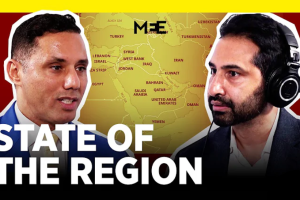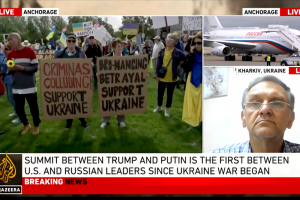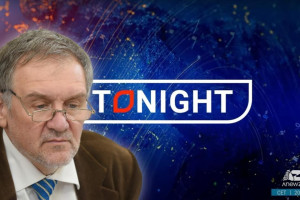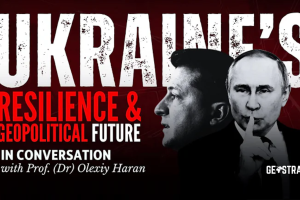'A Ukraine Peace Plan That Excludes Ukrainians Is Unacceptable'
.jpg) Last week, The Atlantic published a 24-point plan for ending the conflict between Russia and Ukraine—the product of a meeting between Russian and American experts and former officials on the Finnish island of Boistö. Now, a group of American and European experts and former officials, coordinated by David Kramer of Freedom House, has written a response, rejecting the Boistö agenda and urging Russia to end its aggression against Ukraine.
Last week, The Atlantic published a 24-point plan for ending the conflict between Russia and Ukraine—the product of a meeting between Russian and American experts and former officials on the Finnish island of Boistö. Now, a group of American and European experts and former officials, coordinated by David Kramer of Freedom House, has written a response, rejecting the Boistö agenda and urging Russia to end its aggression against Ukraine.
The letter—which comes as Ukrainian and Russian officials are holding talks in Belarus with Ukrainian separatists and international mediators, amid escalating hostilities in the region—argues that the exclusion of Ukrainians from the summit in Finland "disqualifies this initiative from any serious consideration." The days when Russia and the U.S. could decide "the fate of other independent countries" are over, the authors write.
We the undersigned firmly reject the “24-step plan to resolve the Ukraine crisis” published on August 26 by The Atlantic in the United States and Kommersant in Russia. This ill-conceived plan emerged from a Track II initiative involving Russian and American participants who met recently on the Finnish island of Boistö, and was supported by the Finnish Ministry of Foreign Affairs, the Carnegie Corporation of New York, and the Institute of World Economy and International Relations (IMEMO) in Moscow.
We reject the decision to exclude Ukrainians from this initiative. Such a decision reinforces the worst instincts that prevail in Russia—and possibly even among some Americans—that Ukraine is not a truly independent country and that Russia can, with U.S. endorsement, determine its fate. That nobody from Ukraine was invited to participate disqualifies this initiative from any serious consideration.
Beyond that most fundamental problem and without addressing every objectionable “step,” four additional points are worth raising.
First, the initiative treats the Russian and Ukrainian sides as equals and fails to recognize Russia as the aggressor, having invaded Ukraine. This equivalence is particularly glaring in the plan’s call for the “withdrawal of regular Russian and Ukrainian army units to an agreed distance from conflict zones.” Ukraine has neither attacked Russia nor sought to limit its sovereignty. Ukrainian authorities have every right, indeed responsibility, to confront hostile, foreign forces on their territory. Russia must remove all of its forces from Ukraine and stop attacking and invading its neighbor.
Second, the initiative raises a number of “humanitarian and legal issues” as well as “social and cultural issues” that are the business of Ukrainians first and foremost, not Russians or Americans. Again, the exclusion of Ukrainians from this process is unacceptable.
Third, the signers of this initiative seem to have accepted the absorption of Crimea into Russia, despite the fact that Moscow has broken international law, contravened border treaties, and taken the peninsula by force. We find unacceptable recommendations that in practice would create another frozen conflict in Europe, with all that this implies for the internal and external security of Russia’s neighbors. We similarly reject the initiative’s call for “discussion of the settlement of legal issues pertaining to the status of Crimea,” for this is not merely the height of injustice but a dangerous precedent.
Fourth, the initiative calls for permanent guarantees of Ukraine’s “non-bloc status.” Such constraints on Ukraine’s security relationships—including those established under NATO’s Partnership for Peace and the 1997 NATO-Ukraine Distinctive Partnership—are a serious infringement of national sovereignty. They would also give the impression of rewarding the Putin regime for its outrageous actions, and this, too, is wholly unacceptable.
There are many more problems with this initiative, but we have restricted ourselves to the most blatant ones. The bottom line is that Russia must end its invasion of and aggression toward Ukraine, withdraw its forces and fighters, rescind its annexation of Crimea, and end its use of energy and economic measures to punish Ukraine and its other neighbors. Russia will never become the civilized state its citizens deserve without such a transformation.
Until Russia does so, the West must ratchet up serious sanctions against the Putin regime and immediately provide Ukraine with the full support, including military equipment and intelligence cooperation, it needs and has requested to defend itself.
Ukraine is not simply a problem in the West’s relations with Russia. It is a country in its own right that is entitled to the prerogatives afforded to all sovereign states under the UN Charter and the 1990 Charter of Paris. Its borders and territorial integrity were solemnly recognized by the Russian Federation in the 1994 Budapest Memorandum and the 1997 Russia-Ukraine State Treaty. These are the pillars of security in Europe, and there will be serious consequences for other European states if they are disregarded or traduced.
We should consign to the dustbin of history the days of “condominium” between Russia and the U.S. in deciding the fate of other independent countries.
* * *
Hannes Adomeit: College of Europe
Anders Aslund: Senior fellow, Peterson Institute for International Economics
Iryna Bekeshkina: Director, Ilko Kucheriv Democratic Initiative Foundation; senior research fellow, the Institute of Sociology of the National Academy of Sciences
Stephen Blank: Senior fellow, American Foreign Policy Council
Falk Bomsdorf: Director, Friedrich-Naumann-Foundation, Moscow office, 1993-2009
Ellen Bork: Senior fellow, Foreign Policy Initiative
Anna Borshchevskaya: European Foundation for Democracy
Robert Brinkley: Former U.K. Ambassador to Ukraine
Vyacheslav Bryukhovetskyy: Chancellor, the University of Kyiv-Mohyla Academy
Matthew Bryza: Former ambassador; director, International Centre for Defence Studies, Tallinn, Estonia
Ian Brzezinski: Former deputy assistant secretary of defense for Europe and NATO policy
Yevhen Bystrytsky
George Chopivsky, Jr.: President, Chopivsky Family Foundation
Susan Corke: Eurasia program director, Freedom House
Lorne Craner: Former assistant secretary of state for democracy, human rights, and labor
Charles Davidson: Publisher, The American Interest
Jim Denton: World Affairs Journal
Nadia Diuk: Vice president, National Endowment for Democracy
Ambassador Paula J. Dobriansky
Marta Farion: President, Kyiv Mohyla Foundation of America
Ambassador Julie Finley: Former U.S. permanent representative to the OSCE
Oleksandr Fisun: Professor of political science, Kharkiv National University
Joerg Forbrig
Alison Fortier
Jeff Gedmin: Georgetown University
Carl Gershman: President, National Endowment for Democracy
Paul Goble
Alyona Getmanchuk: Director, Institute of World Policy, Kiev
James Greene: Former head of NATO Liaison Office, Ukraine
Janet Gunn: Former research analyst, U.K. Foreign & Commonwealth Office
Michael Haltzel: Center for Transatlantic Relations, Johns Hopkins University SAIS
Olexiy Haran: Professor of comparative politics, Kyiv-Mohyla Academy, Ukraine
John Herbst: Former ambassador; director of the Eurasia Center, Atlantic Council
William Hill: Public policy fellow, Kennan Institute; former OSCE head of mission in Moldova
Jeffrey Hirshberg
Volodymyr Horbach: Political analyst, Institute for Euro-Atlantic Cooperation, Kiev
Yaroslav Hrytsak: Professor, Ukrainian Catholic University, Lviv
Andrei Illarianov
Don Jensen: Senior fellow, Center for Transatlantic Relations, Johns Hopkins University SAIS
Adrian Karatnycky: Senior fellow and co-director, Ukraine in Europe Program, Atlantic Council
Richard Kauzlarich: Former U.S. ambassador to Azerbaijan and Bosnia and Herzegovina
Jamie Kirchick: Fellow, Foreign Policy Initiative
Evgeni Kiselev: Journalist
Igor Klyamkin: Vice president, Liberal Mission Foundation
Ivanna Klympush-Tsintsadze: Executive director, Yalta European Strategy; board member, Ukraine Crisis Media Center
Jim Kolbe: Senior transatlantic fellow, German Marshall Fund of the United States
A.F. Kolodii: Professor, dr., chair of political science and philosophy, Lviv Regional Institute of Public Administration; National Academy of Public Administration under the president of Ukraine
David J. Kramer: President, Freedom House
Robert McConnell: McConnell & Associates
Michael McFaul: Stanford University
Oleksiy Melnyk: Director, Foreign Relations and International Security Programmes, Razumkov Centre
Marie Mendras: Sciences Po
Leigh Merrick: British DA Kyiv; director, NATO Liaison Office in Ukraine, 1995-2003
Wess Mitchell: President, CEPA
Alberto Mora: 2014 advanced leadership fellow, Harvard University
Julia Mostovaya: Editor in chief, Zerkalo Nedeli
Alex Motyl: Rutgers University-Newark
Josh Muravcik: Fellow at Johns Hopkins University SAIS
James Nixey: Head, Russia and Eurasia Programme, Chatham House
Craig Oliphant: Foreign Policy Centre
Lesya Orobets: Member of parliament of Ukraine; secretary to Foreign Affairs Committee
Inna Pidluska: Deputy executive director, International Renaissance Foundation
Arch Puddington: Vice president for research, Freedom House
Anatoly Rachok: Director general, Razumkov Centre
Roy Reeve: Former British ambassador to Ukraine
Georgii Satarov: President of INDEM
David Satter
Randy Scheunemann
Oleh Shamshur: Former Ukrainian ambassador to the U.S.
James Sherr: Associate fellow, Russia and Eurasia Programme, Chatham House
Andriy Shevchenko: MP; first deputy chairman, Human Rights Committee, Kiev
Lilia Shevtsova: Senior associate, Carnegie Moscow Center
Yuriy Shveda: Associate professor, Lviv Ivan Franko National University
Roland Smith: Former British ambassador to Ukraine
Maria Snegovaya: Columnist, Vedomosti
Oleksandr Sushko: Research director, Institute for Euro-Atlantic Cooperation, Kiev
Strobe Talbott
William B. Taylor: Former ambassador to Ukraine; vice president, Middle East and Africa, United States Institute of Peace
Ed Verona: Senior advisor, McLarty Associates; former president, U.S.-Russia Business Council
Melanne Verveer: Former U.S. ambassador for global women’s issues
Kurt Volker: Executive director, McCain Institute
Christopher Walker: Executive director, International Forum for Democratic Studies, National Endowment for Democracy
Leon Wieseltier
Morgan Williams: U.S.-Ukraine Business Council
Michael Weiss: Editor in chief, The Interpreter; fellow, Institute of Modern Russia
Sir Andrew Wood: Associate fellow, Chatham House; former British ambassador to Russia
Yuriy Yakymenko: Deputy director general - director of political and legal programs, Razumkov Centre, Kiev
Walter Zaryckyj: Center for U.S.-Ukrainian Relations
Josef Zissels: Chairman, Association of Jewish Organizations and Communities of Ukraine; head, Congress of Ethnic Communities of Ukraine
Note: Organizations, where listed, are for identification purposes only.








